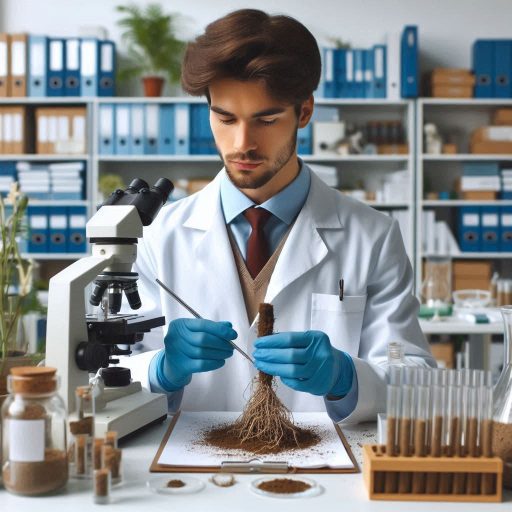Introduction
Attending soil science conferences and events is crucial for professionals in the field.
These gatherings foster learning, collaboration, and innovation.
They serve as platforms for sharing the latest research and advancements in soil science.
Conferences bring together experts, researchers, and practitioners.
This diverse mix creates an environment ripe for knowledge exchange.
Participants can learn from presentations, workshops, and panel discussions led by industry leaders.
Networking opportunities abound at these events.
Attendees can connect with peers, mentors, and potential collaborators.
Building these relationships enhances career growth and opens doors to new opportunities.
Additionally, conferences highlight current trends and challenges in soil science.
Professionals gain insights into emerging technologies and methodologies.
This knowledge is vital for staying competitive and relevant in the field.
Furthermore, conferences often feature educational sessions tailored to various experience levels.
These sessions provide practical skills and knowledge that attendees can apply in their work.
Attending soil science conferences is essential for professional development.
They offer valuable knowledge and networking opportunities that benefit all professionals in the field.
Embrace the chance to connect, learn, and grow within the soil science community.
Key soil science conferences to consider attending
Soil science plays a vital role in sustainable agriculture and environmental management.
Attending conferences in this field allows professionals to network, share research, and gain new insights.
Here are some key soil science conferences you should consider.
Some of the Top Conferences in the Field
Soil Science Society of America Annual Meeting
The Soil Science Society of America (SSSA) Annual Meeting is a premier event in the field.
This year, it will take place from November 10 to 13 in San Antonio, Texas.
The theme is ‘Soils: The Foundation of Life.‘
This conference will explore various aspects of soil health, management, and conservation.
Expect presentations from leading researchers, panel discussions, and workshops.
Attendees can participate in technical sessions that cover topics such as soil fertility, land use, and climate change.
Networking opportunities abound, allowing professionals to connect with peers and potential collaborators.
The SSSA Annual Meeting also features an exhibit hall showcasing the latest technologies and services in soil science.
International Conference on Soil Science
The International Conference on Soil Science (ICSS) gathers experts from around the world to discuss soil-related issues.
This year‘s conference will occur from September 25 to 27 in Sydney, Australia.
The theme is ‘Innovations in Soil Science for a Sustainable Future.‘
The conference aims to address the challenges facing soil science today.
Participants can attend keynote speeches from renowned scientists and engage in interactive workshops.
The ICSS will cover topics such as soil remediation, sustainable land management, and soil conservation practices.
This event provides a global platform for researchers to present their findings and share best practices.
Details on the Dates, Locations, and Themes of These Conferences
World Congress of Soil Science
Another essential conference is the World Congress of Soil Science (WCSS), which takes place every four years.
The next WCSS will be held from July 7 to 12, 2026, in New Delhi, India.
The theme for this congress is ‘Soil Health and Sustainable Development.‘
This event draws thousands of attendees from various countries.
Participants can expect a rich program of sessions, workshops, and poster presentations.
The congress will highlight recent advances in soil science, innovative practices, and policy discussions.
Networking opportunities will enable attendees to forge connections and collaborations that can drive future research.
Other Notable Conferences
In addition to these major events, several regional conferences are worth considering.
The European Conference on Soil Science will take place in 2025, focusing on European soil issues.
The Australian Soil Science Society also hosts annual meetings that cater to local professionals.
These conferences provide unique opportunities to engage with soil science communities.
Each event offers tailored sessions that address specific regional soil concerns and innovations.
Attending these conferences can enhance your understanding of soil science and expand your professional network.
Attending soil science conferences enriches knowledge and fosters collaboration.
Mark your calendars for these key events and take advantage of the opportunities they present.
Read: U.S. Cities with the Most Opportunities for Environmental Scientists
Benefits of Attending Soil Science Conferences
Attending soil science conferences offers numerous benefits for professionals in the field.
These events provide opportunities to learn about the latest trends and research developments.
Here‘s how attending these conferences can enhance your career and knowledge.
How Attending Conferences Can Help Professionals Stay Current on Industry Trends and Research Developments
Conferences allow professionals to stay updated on the latest industry trends.
Keynote speakers often include leading experts who share valuable insights.
Attendees gain exposure to cutting-edge research and emerging technologies in soil science.
Participating in technical sessions deepens understanding of specific topics and challenges.
Conferences feature a range of presentations that address current issues.
Topics may include soil health, sustainability, and climate change impacts.
Learning about innovative practices can inspire new ideas for your projects.
Access to the latest research can help you implement effective soil management strategies.
Moreover, workshops provide hands-on experiences with new tools and techniques.
These sessions often include demonstrations of innovative technologies.
Engaging in discussions enhances your understanding of practical applications.
This knowledge allows you to apply the latest findings to your work.
How Networking at These Events Can Lead to Collaborations and Career Opportunities
Networking at soil science conferences fosters valuable connections among professionals.
Meeting colleagues from different institutions creates opportunities for collaboration.
Engaging in conversations can lead to partnerships on research projects.
Networking also opens doors to potential job opportunities.
During networking events, you can share your expertise and learn from others.
These interactions help build professional relationships that can benefit your career.
Establishing a strong network enhances your visibility in the field.
Colleagues may recommend you for positions or projects based on your expertise.
Attending conferences also provides access to influential leaders in the industry.
Engaging with these experts can lead to mentorship opportunities.
Mentors can provide guidance on career advancement and research direction.
Their insights can help shape your professional journey in soil science.
Conferences encourage the exchange of ideas among participants.
Engaging in discussions with peers can lead to new perspectives.
Sharing your research and findings helps improve collective knowledge in the field.
This collaborative environment fosters innovation and drives progress.
By attending conferences, you can stay informed about funding opportunities and grants.
Many organizations announce new funding initiatives at these events.
Staying informed allows you to take advantage of these opportunities.
Attending soil science conferences is invaluable for professionals.
These events keep you current on trends and research while providing networking opportunities.
The connections you make can lead to collaborations and career advancement.
By participating in these conferences, you enhance your knowledge and contribute to the soil science community.
Make it a priority to attend relevant conferences and invest in your professional development.
Read: Environmental Scientist vs. Ecologist: Roles and Differences in the US
Educational sessions and workshops
Soil science conferences offer a variety of educational sessions and workshops.
These sessions provide valuable insights into the latest research and practical applications.
Attendees can enhance their knowledge and skills through these opportunities.
Types of Educational Sessions
Conferences typically feature several types of educational sessions.
Keynote presentations showcase leading experts discussing current trends in soil science.
These sessions often cover topics such as soil health, sustainable agriculture, and climate change impacts.
Breakout sessions delve deeper into specific subjects.
They allow participants to explore focused topics in detail.
These sessions may include discussions on soil microbiology, nutrient management, or land use practices.
Attendees can select sessions that align with their interests and professional needs.
Panel discussions provide a platform for experts to debate pressing issues.
These discussions often include diverse perspectives from different regions and disciplines.
Attendees can engage with panelists, asking questions and sharing their viewpoints.
Poster sessions allow researchers to present their findings in a visual format.
These sessions encourage informal discussions between presenters and attendees.
Participants can gain insights into cutting-edge research and innovative practices.
Workshops for Hands-On Learning
Workshops at soil science conferences emphasize hands-on learning experiences.
These sessions focus on practical skills and techniques that attendees can apply in their work.
Participants often engage in interactive activities, enhancing their understanding of complex topics.
For example, workshops may cover soil sampling techniques.
Attendees learn best practices for collecting and analyzing soil samples.
This knowledge is crucial for accurate soil assessments and effective management strategies.
Another common workshop topic is soil testing methods.
Participants can learn how to conduct tests that evaluate soil health and fertility.
Understanding soil properties helps professionals make informed decisions about land management.
Workshops may also focus on innovative technologies in soil science.
Attendees can explore the use of drones, remote sensing, or data analysis tools.
Gaining hands-on experience with these technologies prepares professionals for future challenges.
Practical Skills and Knowledge Gained
Attending educational sessions and workshops equips participants with practical skills.
These skills enhance their ability to address real-world challenges in soil science.
The knowledge gained empowers professionals to implement effective soil management practices.
Moreover, workshops often provide materials and resources for further learning.
Attendees can take home guides, manuals, or access to online resources.
These materials support ongoing education and application of new skills.
In addition, participants can build a network of peers during these sessions.
Engaging in discussions and activities fosters collaboration among attendees.
This networking can lead to future partnerships and research opportunities.
Educational sessions and workshops at soil science conferences are invaluable.
They offer a mix of theoretical knowledge and practical skills.
Attendees can stay current on industry trends and learn new techniques.
Investing time in these sessions enhances professional growth and contributes to advancements in soil science.
Read: The Relationship Between U.S. Policy & Environmental Scientist Roles
Transform Your Career Today
Unlock a personalized career strategy that drives real results. Get tailored advice and a roadmap designed just for you.
Start Now
Opportunities for presenting research
Soil science conferences provide excellent platforms for professionals to present their research findings.
These events attract diverse audiences, including scientists, policymakers, and industry experts.
Presenting at conferences helps researchers share their work with a broader community.
How Soil Science Conferences Offer a Platform for Professionals to Present Their Research Findings
Presenting research at soil science conferences can significantly enhance visibility.
Researchers can showcase their findings through oral presentations or poster sessions.
Oral presentations allow for in-depth discussions, while poster sessions facilitate informal interactions.
Each presentation typically includes a Q&A session.
This interactive format encourages audience engagement and fosters lively discussions.
Attendees can ask questions, seek clarification, and provide insights about the presented work.
This exchange enriches the overall conference experience.
Conferences often publish proceedings that include accepted research presentations.
This publication provides lasting recognition for researchers and their work.
Being included in conference proceedings can enhance a researcher‘s credibility and visibility in the field.
Benefits of Receiving Feedback and Insights from Fellow Experts in the Field
Receiving feedback from fellow experts is one of the most significant advantages of presenting research.
Audience members can offer constructive criticism and alternative perspectives.
This feedback can help researchers refine their work and improve their methodologies.
Engaging with experts can also provide new ideas for future research directions.
Insights gained from discussions can inspire researchers to explore new avenues.
This input can lead to innovative approaches and solutions in soil science.
Additionally, feedback from peers can validate a researcher‘s findings.
Positive reinforcement from respected colleagues boosts confidence in the work being presented.
This validation is crucial for early-career researchers looking to establish themselves in the field.
Presenting at conferences enhances a researcher‘s professional profile.
It demonstrates a commitment to advancing knowledge in soil science.
Such presentations can open doors to new funding opportunities and job prospects.
Many funding organizations look favorably upon researchers who actively share their work.
Conferences allow researchers to demonstrate their expertise and dedication to the field.
This visibility can lead to potential collaborations and grant opportunities.
Soil science conferences offer invaluable opportunities for presenting research.
They provide a platform for sharing findings, receiving feedback, and networking with peers.
The benefits of engaging with fellow experts can enhance a researcher‘s work and career.
Participating in these conferences fosters professional growth and contributes to the advancement of soil science.
Read: Organizations & Associations for Environmental Scientists in the USA
Networking opportunities
Networking is a vital component of soil science conferences.
These events create spaces for professionals to connect and collaborate.
Engaging with peers can lead to valuable relationships that benefit your career.
Networking Events and Activities Organized at Soil Science Conferences
Soil science conferences typically feature various networking events.
Many conferences host welcome receptions for attendees to mingle.
These informal gatherings encourage participants to meet others in a relaxed environment.
Lunch and coffee breaks provide additional opportunities for networking.
These moments allow attendees to engage in casual conversations.
Sharing experiences over a meal can foster connections and discussions about common interests.
Workshops and panel discussions often include networking components.
Attendees can engage with speakers and fellow participants.
These interactions help build rapport and enhance collaborative opportunities.
Some conferences organize specific networking sessions.
These sessions may focus on connecting early-career professionals with seasoned experts.
Structured activities, such as speed networking, can facilitate introductions and discussions.
Exhibitor halls also serve as networking spaces.
Attendees can interact with industry representatives and learn about new technologies.
These conversations may lead to partnerships or research collaborations.
Tips for Making the Most of These Networking Opportunities and Building Valuable Connections with Other Professionals
To maximize networking opportunities, prepare in advance.
Research attendees and speakers to identify those you want to meet.
Having a clear goal will guide your networking efforts.
Create a concise elevator pitch to introduce yourself.
This pitch should include your background and areas of interest.
Practicing your introduction will help you feel confident in conversations.
During networking events, actively engage with others.
Ask open-ended questions to encourage discussion.
Showing genuine interest in others fosters meaningful connections.
Be approachable and maintain a positive attitude.
A friendly demeanor attracts people and encourages conversation.
Smile and make eye contact to establish rapport.
Follow up after the conference to strengthen connections.
Send personalized messages to individuals you met.
Express your appreciation for their time and insights.
This gesture reinforces your interest in maintaining the relationship.
Utilize social media platforms like LinkedIn for networking.
Connect with attendees and share your conference experiences.
Joining relevant groups and discussions can help expand your network further.
Attend subsequent events hosted by the same organization.
Regular participation will increase your visibility and foster lasting relationships.
Consistency in networking efforts can lead to fruitful collaborations.
Networking opportunities at soil science conferences are essential for professional growth.
Various events and activities encourage connections among attendees.
By preparing in advance and actively engaging with others, you can build valuable relationships.
Embrace these opportunities to enhance your career and contribute to the soil science community.
Gain More Insights: Nuclear Scientists: Collaboration and Teamwork
Delve into the Subject: Common Challenges in Neuroscience Research
Costs and Budgeting Considerations
Attending soil science conferences involves various costs.
Understanding these expenses helps professionals plan effectively.
Budgeting for registration, travel, and accommodation is essential for a successful experience.
Information on the Registration Fees, Travel Expenses, and Accommodation Costs
Registration Fees
Registration fees for soil science conferences vary.
Early registration often offers discounts compared to on-site registration.
Fees may also differ for students, professionals, and members of organizing societies.
Review the conference website for detailed fee structures.
Some conferences provide tiered pricing based on the date of registration.
Make sure to register early to save money.
Travel Expenses
Travel expenses can significantly impact your overall budget.
Consider transportation options such as flights, trains, or driving.
Researching and comparing transportation costs can lead to significant savings.
Book travel in advance to secure the best rates.
Flexibility with travel dates may help reduce costs.
Consider flying into nearby airports to find lower fares.
Don‘t forget to account for local transportation expenses.
Public transit or ridesharing services can help you get around the conference location.
Check the conference venue‘s website for transportation options and recommendations.
Accommodation Costs
Accommodation costs can vary widely depending on location and duration of stay.
Look for hotels or lodgings near the conference venue.
Booking early often provides better rates and availability.
Consider sharing accommodation with colleagues to split costs.
Alternatively, explore options like hostels or short-term rentals.
These options may offer more affordable stays.
Research any discounts offered by the conference for nearby hotels.
Many conferences partner with local hotels to provide reduced rates for attendees.
Always read the fine print regarding cancellation policies.
Strategies for Budgeting and Securing Funding to Cover These Expenses
Creating a detailed budget helps manage expenses.
List all anticipated costs, including registration, travel, and accommodation.
This will provide a clear financial overview.
Set aside funds specifically for conference-related expenses.
If your organization provides professional development funds, inquire about their availability.
Some institutions may cover partial costs for attendance.
Look for sponsorship or grants that support conference attendance.
Professional societies often offer funding for members to attend conferences.
Research available options and submit applications early.
Utilize online crowdfunding platforms for support.
Share your attendance goals with colleagues or social media networks.
Engaging your community may result in financial contributions to support your attendance.
Attending soil science conferences requires careful budgeting.
Registration fees, travel expenses, and accommodation costs can add up.
By planning ahead and exploring funding options, you can manage these expenses effectively.
A well-prepared budget enhances your conference experience and ensures valuable participation in the soil science community.
Find Out More: Biomedical Engineering Lab Techniques and Best Practices
Virtual options and online events
The COVID-19 pandemic accelerated the rise of virtual conferences and online events.
Many soil science conferences adapted to this new reality.
As a result, attendees gained access to a wider range of events.
Rise of Virtual Conferences and Online Events in Response to the COVID-19 Pandemic
Virtual conferences became a necessity during the pandemic.
Organizations sought to maintain engagement while ensuring public safety.
Online platforms allowed participants to connect without geographic limitations.
Many conferences transitioned to fully online formats.
This shift enabled participants from around the world to attend.
As a result, the audience for soil science conferences expanded significantly.
Hybrid models emerged as conferences reopened.
These formats combine in-person and virtual attendance options.
Attendees can choose how they want to participate based on their preferences.
This trend likely continues post-pandemic.
Organizers recognize the value of online accessibility.
They aim to attract diverse audiences and enhance participation.
Benefits of Attending Virtual Conferences, Such as Increased Accessibility and Reduced Costs
Virtual conferences offer several key benefits.
First, they significantly increase accessibility for attendees.
Participants can join from anywhere with an internet connection.
This flexibility allows professionals with tight schedules to attend.
It also benefits those unable to travel due to personal or professional commitments.
Geographic barriers diminish, enabling wider participation.
Another major advantage is reduced costs.
Virtual conferences eliminate many traditional expenses.
Attendees save on travel, accommodation, and meals.
This financial relief allows more professionals to participate.
Many virtual conferences offer lower registration fees.
This makes it easier for students and early-career professionals to attend.
Lower costs encourage participation from a broader audience.
Virtual events often provide recorded sessions.
Attendees can revisit presentations and discussions at their convenience.
This feature enhances the learning experience by allowing participants to absorb information fully.
Networking opportunities also exist in virtual formats.
Many online platforms facilitate networking through breakout rooms and chat functions.
Attendees can still engage with peers and experts.
However, networking in virtual environments differs from in-person settings.
Attendees may need to actively seek out connections.
Engaging in discussions can foster relationships and collaborations.
Overall, virtual conferences provide valuable opportunities.
They expand access to knowledge and networking in soil science.
Attendees enjoy greater flexibility and reduced costs.
The rise of virtual options reshaped the landscape of soil science conferences.
Online events enhance accessibility and affordability for participants.
This trend opens doors for more professionals to engage in soil science discussions and advancements.
Virtual conferences can complement traditional formats, creating a more inclusive scientific community.
You Might Also Like: The Intersection of Space Science and AI
Conclusion
Attending soil science conferences is vital for professional development and networking.
These events provide opportunities to learn from experts in the field.
They also help attendees stay updated on the latest research and industry trends.
Networking is another crucial benefit of these conferences.
Professionals can connect with peers, potential collaborators, and mentors.
Building these relationships can lead to new opportunities and advancements in your career.
Conferences also offer educational sessions and workshops.
Participants can gain practical skills and insights to apply in their work.
Presenting research at these events enhances visibility and credibility within the community.
As the field of soil science evolves, staying engaged is essential.
Upcoming conferences present valuable opportunities to expand your knowledge and network.
Whether in-person or virtual, these events cater to various preferences and schedules.
I encourage you to consider attending an upcoming soil science conference.
Take advantage of the learning and networking opportunities available.
Investing your time in these events will yield significant benefits for your professional growth.
Embrace the chance to connect, learn, and contribute to the soil science community.
Your involvement can shape the future of the field.




